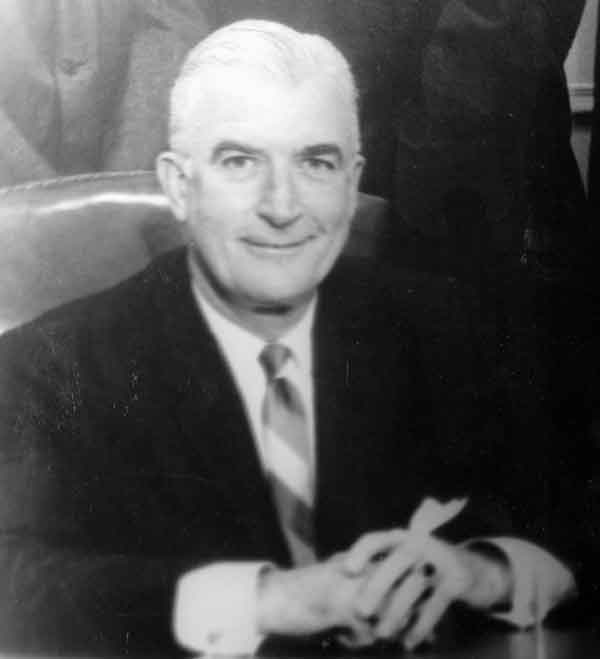Edward H. Ould, Jr. was born on September 13, 1907, to Ethel and Ed Ould. Ed’s father was the president of the Bank of Norton and owned a country store and coal mine. Ed helped his father deliver the payroll by horseback. Ed’s father died in 1919 when Ed was only 12 years old and his mother, now widowed with three children, moved to Roanoke. He then assumed many adult responsibilities and learned to take charge.
As a 1925 graduate of Jefferson High School, Ed was known as, “one of the most popular boys in the senior class” and as “one who took an active part in almost all high school activities.” It seems fortuitous he was a member of a class whose slogan was “first and foremost”. Ed enrolled at Washington & Lee University and received his Bachelor of Science Degree in Business Administration in 1929.
Ed’s first job was selling stocks and bonds for F.W. McWane & Company and in 1933, he accepted a job with the old Roanoke Bond Company. His jobs during the Great Depression only increased his tenacity and work ethic. Although the country was in the midst of the Depression, Ed met and fell in love with Madolyn Burruss Airheart. They were married on October 21, 1933, and had two children, Ed H. Ould III (Ted) and Mary Robertson (Robin). They enjoyed 39 years of marriage until her death in 1972.
Ed Ould’s career with First National Exchange Bank would ultimately span more than 40 years: from the lean, money-short, depression era of the 1930’s to the competitive 1970’s. He started at FNEB in 1936 when he accepted a part-time job offer from J. Tyler Meadows, Chairman. He was quickly elevated to Vice- President. In 1949, he was named Executive Vice-President and by 1950, he was a director.
During WWII, at the age of 35, Ould applied for a commission in the US Naval Reserve. He was named commanding officer of the Roanoke Volunteer Naval Reserve Supply Division in 1948 and was commended with a Certificate of Appreciation before being honorably discharged as a Lieutenant from the United States Navy in 1950.
Ould would become FNEB’s seventh president in 1956. His professional and civic achievements, by this time, were countless. In addition to serving on the Board of Directors for the Times-World Corporation, the Roanoke Symphony Society and the United Fund Drive, he chaired the Red Cross Fund Drive and was president of the Chamber of Commerce in 1949. He and the local Merchants Association were instrumental in erecting the star on Mill Mountain. Ed also spent countless hours in service to his community and state, with particular emphasis on serving youth. He was a director of the Blue Ridge Council and Boy Scouts of America and served as a Board member of the YMCA. His interests in educational institutions extended over and above his ties to Washington & Lee University. He was on the Board of Trustees for Roanoke College and North Cross School, and he accepted an appointment from the Governor to the VMI Board of Visitors. He was among the founders of the Roanoke Junior Achievement and believed in the value of work and supported opportunities for youth to have business experience. In 1957, he was listed in “Who’s Who in America.”
Some of the most interesting times in Roanoke Banking history occurred in the 1960’s. Ould began the expansion course he charted for FNEB with the merger of Peoples National Bank in 1960. In the next few years, 14 banks joined FNEB, tripling the bank’s size and consolidating their position in Southwest Virginia. When asked about the phenomenal growth the bank enjoyed during his leadership, he would modestly say, “we don’t regard size as significant, except that it enables the bank to make larger loans and provide stronger service.”
By 1967, Ould headed another form of expansion when FNEB and Metropolitan National Bank in Richmond combined to form Dominion Bank=shares, the first and largest holding company in the state based on this side of Richmond. During Ed’s years as president, assets at FNEB multiplied almost nine times. The bank’s operations expanded from 2 to 35 offices, and assets grew from $92 million in 1956 to $834 million in 1977 (over $4 billion today). It has been said by many that Ed Ould clearly saw the potential of FNEB in Southwest Virginia in the late 1950’s. He has been recognized for his keen perception of the future and ability to effectively meet, in advance, those economic and consumer demands. He attributed much of his success to the “good fortune of a talented management staff” and said, “I did work very hard, mostly because I loved the business, but partly, too, because I’ve always tried to have consideration for others and have had their support.” A former colleague once said that Ould “never sought recognition or publicity. He is one of the silent giants of the business and banking worlds of Virginia.”
He enjoyed gardening, boating and tennis, but his favorite pastime was banking. He was intensely dedicated to his profession, and exuded leadership. His daughter, Robin, remembers her father saying, “I never woke up when I did not want to go to work.” Ed retired from active banking in 1977 and was recognized as one of Virginia’s greatest bankers and business leaders until his death in 1979. He was inducted into the Southwest Virginia Business Hall of Fame in 1996.
Edward H. Ould was inducted into the Southwest Virginia Business Hall of Fame in 1996.

